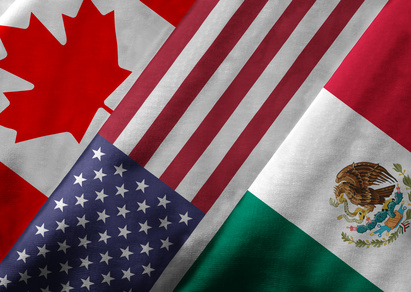NAFTA: We avoided the worst, but we’re far from true free trade

Montreal, October 1st, 2018 – The trade deal concluded yesterday between Canada, the United States, and Mexico, according to preliminary information, seems to pave the way for a relatively positive resolution, given its importance for the Canadian economy as a whole, despite some sizable irritants.
“Obviously, hundreds of thousands of jobs in Canada depend on it, and from this point of view, saving the agreement is a good thing,” points out Michel Kelly-Gagnon, President and CEO of the MEI. “It is however regrettable to observe that our trade deals increasingly feature ‘managed trade’ rather than true free trade.”
“A true free trade deal would not contain hundreds of pages detailing countless exceptions, limits, quotas, and other barriers to trade. Unfortunately, this is a major trend present in most trade agreements, for which we cannot really blame the Canadian negotiators,” says Mr. Kelly-Gagnon.
As for the share of the dairy market opened up as part of the deal, we must remember that despite what is often reported, almost all of our agricultural sector is already subject to competition, and does quite well on world markets. The problem is that the deal surrenders more market share, all while keeping our dairy producers shackled by the current system.
“We’re reducing their market without giving them the means to compete,” points out Alexandre Moreau, Public Policy Analyst at the MEI. “Moreover, taxpayers will probably be stuck with a very steep bill to compensate for these losses, and the system of quotas and tariffs will remain in place. Finally, these concessions will not be sufficient to generate substantially lower prices for consumers. It’s lose-lose-lose.”
The maintenance of aluminum and steel tariffs, as well as certain restrictions on exports to the United States of vehicles manufactured in Canada, is also unjustifiable. “Nor are these tariffs in the interest of American consumers, who will have to pay more for their cars,” adds Mr. Moreau.
It is precisely from the perspective of the consumer that the proposed agreement should be judged: “We have to stop seeing this debate through the prism of mercantilism, a long-discredited economic doctrine according to which trade is a zero-sum game in which importers are necessarily losers,” notes Mr. Kelly-Gagnon. “On the contrary, obtaining goods and services at lower cost thanks to trade with others is at the very basis of the process of individual enrichment, with all due respect to Donald Trump and other mercantilists.”
“Subject to a more detailed analysis of the proposed deal, preserving a trade agreement between Canada and the United States is nonetheless a resolution that is more positive than negative. Realistically, Canada could not allow itself to sit on the sidelines,” concludes Mr. Kelly-Gagnon.
* * *
The MEI is an independent public policy think tank. Through its publications and media appearances, the MEI stimulates debate on public policies in Quebec and across Canada by proposing reforms based on market principles and entrepreneurship.
-30-
Interview requests: Pascale Déry, Vice President, Communications and Development, MEI. Tel.: 514-273-0969 ext. 2233 / Cell: 514-502-6757 / E-mail: pdery@iedm.org

